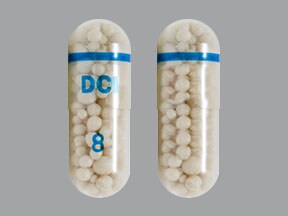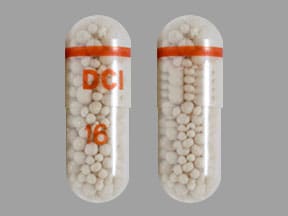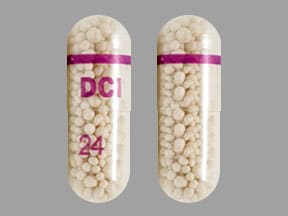What is Pertzye?
Pertzye is a prescription medicine used to treat people who cannot digest food normally because their pancreas does not make enough enzymes due to cystic fibrosis or other conditions.
Pertzye capsules contain a mixture of digestive enzymes including lipases, proteases and amylases from pig pancreas.
Pertzye is safe and effective in children when taken as prescribed by your doctor.
What is the most important information I should know about Pertzye?
Pertzye may increase the risk of having a rare bowel disorder called fibrosing colonopathy, especially if taken at a high dose in children with cystic fibrosis who are less than 12 years of age. This condition is serious and may require surgery. The risk of having fibrosing colonopathy may be reduced by following the dosing instructions that your doctor gives you.
Call your doctor right away if you have any unusual or severe:
- stomach area (abdominal) pain
- bloating
- trouble passing stool (constipation)
- nausea
- vomiting
- diarrhea
Take Pertzye exactly as prescribed by your doctor. Do not take more or less Pertzye than your doctor tells you to.
What should I tell my healthcare provider before taking Pertzye?
Before taking Pertzye, tell your doctor about all of your medical conditions, including if you:
- are allergic to pork (pig) products
- have a history of blockage of your intestines, or scarring or thickening of your bowel wall (fibrosing colonopathy)
- have gout, kidney disease, or high blood uric acid (hyperuricemia)
- have trouble swallowing capsules
- are pregnant or plan to become pregnant.
- are breastfeeding or plan to breastfeed. It is not known if Pertzye passes into your breast milk. Talk to your doctor about the best way to feed your baby if you take Pertzye.
Tell your doctor about all the medicines you take, including prescription and over-the-counter medicines, vitamins, and herbal supplements.
Know the medicines you take. Keep a list of them and show it to your doctor and pharmacist when you get a new medicine.
How should I take Pertzye?
- See the Instructions for Use that comes with Pertzye on how to give Pertzye by mouth and through a gastrostomy tube.
- Take Pertzye capsules exactly as your doctor tells you.
- You should not switch Pertzye with any other pancreatic enzyme product without first talking with your doctor.
- Do not take more capsules in a day than the number your doctor tells you to take (total daily dose).
- Always take Pertzye with a meal or snack and plenty of fluid. If you eat a lot of meals or snacks in a day, be careful not to go over your total daily dose.
- Your doctor may change your dose based on the amount of fatty foods you eat or based on your weight.
- Pertzye capsules should be swallowed whole. Do not crush or chew the Pertzye capsules or their contents, and do not hold the capsule or capsule contents in your mouth. Crushing, chewing or holding the Pertzye capsules in your mouth may cause irritation in your mouth or change the way Pertzye works in your body.
- Throw away the Pertzye capsule contents-food mixture that is not used. Do not save this mixture for later use.
- If you miss a dose of Pertzye, wait until your next meal or snack and take your prescribed dose. Take your next dose at your usual time. Do not take two doses at one time.
What are the possible side effects of Pertzye?
Pertzye may cause serious side effects, including:
- See "What is the most important information I should know about Pertzye?"
- Irritation of the inside of your mouth. This can happen if Pertzye is not swallowed completely, is crushed or chewed, or is mixed in foods that are not recommended.
- Increase in blood uric acid levels. This may cause worsening of swollen, painful joints (gout) caused by an increase in your blood uric acid levels.
- Allergic reactions, including trouble swallowing or breathing, skin rash, itching, or swelling of your face, eyes, lips, tongue, or throat.
Call your doctor right away if you have any of these symptoms.
The most common side effects of Pertzye include:
- diarrhea
- upset stomach (indigestion)
- cough
Other possible side effects:
Pertzye and other pancreatic enzyme products are made from the pancreas of pigs, the same pigs people eat as pork. These pigs may carry viruses. Although it has never been reported, it may be possible for a person to get a viral infection from taking pancreatic enzyme products that come from pigs.
These are not all of the possible side effects of Pertzye. For more information, ask your doctor or pharmacist.
Call your doctor for medical advice about side effects. You may report side effects to the FDA at 1-800-FDA-1088.
Pertzye Images
General information about the safe and effective use of Pertzye
Medicines are sometimes prescribed for purposes other than those listed in a Medication Guide. Do not use Pertzye for a condition for which it was not prescribed. Do not give Pertzye to other people, even if they have the same symptoms you have. It may harm them. You can ask your pharmacist or doctor for information about Pertzye that is written for health professionals.
How should I store Pertzye?
- Store Pertzye at room temperature 68ºF to 77ºF (20ºC to 25ºC).
- Keep Pertzye in a dry place and in the original container or equivalent air tight container.
- After opening the bottle, keep it tightly closed between uses to keep your medicine dry (protect it from moisture).
- The Pertzye bottle contains a desiccant packet to help keep your medicine dry. Do not eat or throw away the desiccant packet in your medicine bottle.
Keep Pertzye and all medicines out of the reach of children.
What are the ingredients in Pertzye?
Active Ingredients: lipase, protease and amylase
Inactive Ingredients: sodium bicarbonate, sodium carbonate, cellulose acetate phthalate, sodium starch glycolate, diethyl phthalate, ursodiol, polyvinylpyrrolidone, and talc.
The hard gelatin capsule shells contain: gelatin and water
The green imprinting ink on the 4,000 units of lipase; 14,375 units of protease; 15,125 units of amylase capsules contain: FD&C Blue #1, D&C Yellow #10, black iron oxide, dehydrated alcohol, isopropyl alcohol, butyl alcohol, propylene glycol, shellac and ammonium hydroxide.
The blue imprinting ink on the 8,000 units of lipase; 28,750 units of protease; 30,250 units of amylase capsules contain: FD&C Blue #1, ethanol, methanol, n-butyl alcohol, propylene glycol, shellac and ammonium hydroxide.
The red imprinting ink on the 16,000 units of lipase; 57,500 units of protease; 60,500 units of amylase capsules contain: FD&C Red #40, povidone, titanium dioxide, dehydrated alcohol, sodium hydroxide, butyl alcohol, propylene glycol, isopropyl alcohol, and shellac.
The purple imprinting ink on the 24,000 units of lipase; 86,250 units of protease; 90,750 units of amylase capsules contain: FD&C Blue #2, D&C Red #7, titanium dioxide, strong ammonia solution, propylene glycol, butyl alcohol, isopropyl alcohol, dehydrated alcohol, and shellac.
For more information, go to www.Pertzye.com or call 1-877-882-5950.




